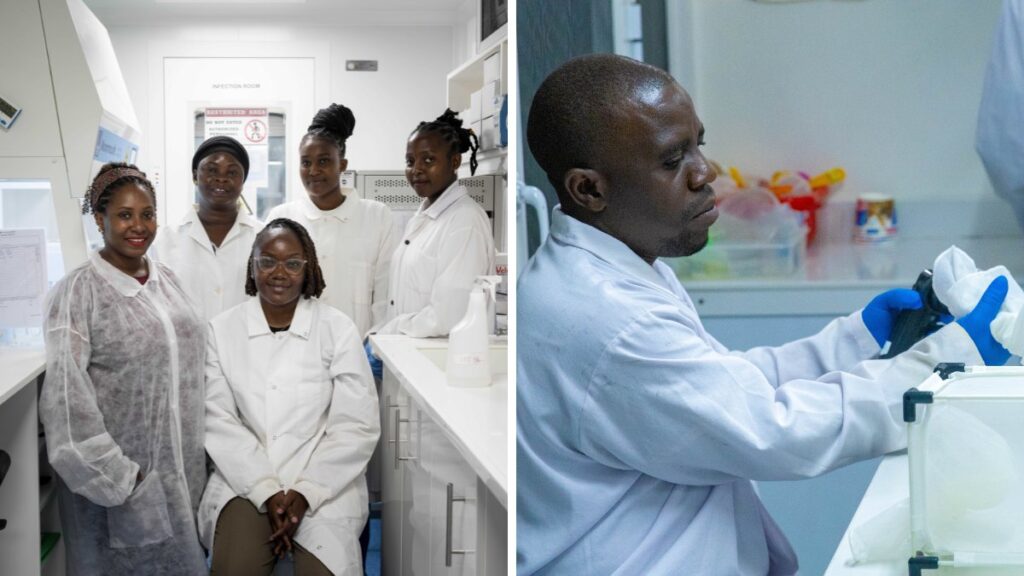Gene drive could reshape the malaria fight and young people must be at the centre
Author: Dr. Phillip Chigiya (ALMA Youth Advisory Council member) | Published: 24 April 2025
The only time I was ever admitted overnight in hospital was when I was five years old. I had malaria. I still remember the strange chill of the sheets, the IV line taped to my small hand, and my mother at my bedside, watching me breathe. That moment has never left me.
Since then, I have moved from patient to practitioner. I have worked in clinics and hospitals across Africa, and malaria has never been far away. I have diagnosed it in children too young to speak, in teenagers missing school, and in pregnant women arriving in labour wards with dangerously low haemoglobin. Sometimes treatment is routine. Sometimes it is a race against time.
It is easy to be swept up by bold declarations, especially on World Malaria Day. But we must be honest. The progress we once celebrated is stalling. In 2023, there were over 263 million new malaria cases and an estimated 597,000 deaths, most of them in Africa. One child dies every minute. Behind every number is a name, a family, and a future lost too soon.
A new chapter in innovation
We are not powerless. New tools are emerging. The rollout of malaria vaccines, first RTS,S and now R21/Matrix-M, is historic. These vaccines will not end malaria on their own, but they are saving lives, especially when combined with other proven interventions, including the new next generation dual insecticide nets.
There is also another breakthrough, less talked about, but with enormous potential. That is gene drive technology.
Gene drive is a form of genetic engineering that changes how mosquitoes reproduce or transmit malaria. Instead of relying on bed nets or insecticides to kill mosquitoes after they bite, gene drive alters the mosquito population itself. It is proactive rather than reactive. Scientists can introduce a trait, such as the inability to transmit malaria, and ensure it is rapidly passed down through generations. The idea is simple: reduce the number of malaria-carrying mosquitoes in a targeted, self-sustaining way.

Left image: Scientists working on transgenesis at the Ifakara Health Institute. Right image: A technician supporting with mosquito colonies rearing.
Why youth must lead
Gene drive science is promising, but also sensitive. It raises important questions about ecology, ethics, governance, and community consent. And that is why young Africans must be at the centre of the conversation. Not just as recipients of innovation, but as co-creators, communicators, and custodians of these solutions.
We are the most connected and educated generation Africa has ever seen. But beyond credentials, we bring urgency. We bring creativity and the courage to challenge assumptions. We refuse to accept that malaria must remain part of our story.
Malaria is more than biology, it is tied to inequality, poverty, weak health systems, and even climate change. It is a “wicked problem,” as Rittel and Webber once put it. And wicked problems need every skill on deck.
We need biologists and engineers. But we also need artists, coders, lawyers, educators, and storytellers. We need youth who can break down complex science into real conversations. We need young voices demanding better policies, stronger investments, and African ownership of malaria research.
We are not waiting
This is not about waiting for a hero or a miracle. It is about recognising that we are already here, and we have something to offer.
I think of my friend Brian Gitta, who created a bloodless malaria diagnostic tool while still a student in Uganda. He was tired of being pricked by needles, so he built an alternative. That is the kind of thinking we need.
If you are a young African, this fight is yours too. It lives in the questions you ask, the ideas you test, and the people you listen to. Innovation does not only happen in labs, it happens in how we imagine a better future and how stubbornly we pursue it.
We may not see the final case of malaria in our lifetimes. But we are the generation that will bring that goal within reach. We will reinvest in what works, reimagine what is possible, and reignite the fight with collective resolve.
We are not waiting for history to happen. We are writing it ourselves.
About the author
Dr Phillip Chigiya is a young, passionate healthcare professional, storyteller, and advocate for youth-led innovation in global health. Born and raised in Africa, Phillip’s journey with malaria began as a child and continues today as he works on the frontlines of care and prevention. Through his writing and practice, he champions the role of young Africans in shaping the future of health solutions, believing that those closest to the problem are often closest to the answers. He is a member of the ALMA Youth Advisory Council.